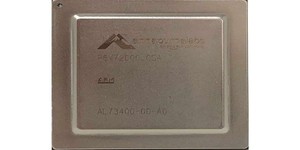Arm releases client CPU roadmap
August 17, 2018 | 11:52
Companies: #acorn-risc-machines #advanced-risc-machines #arm #intel #samsung #softbank

Cambridge-based low-power computing intellectual property (IP) specialist Arm has broken with tradition and released its first-ever public CPU roadmap for client devices - including the promise that it's chasing Intel in the performance stakes with a view to getting itself back onto the desktop.
A spin-off from sadly defunct British microcomputing specialist Acorn Computers and originally known as Acorn, then Advanced, RISC Machines, the now-SoftBank-owned Arm is best known for providing the graphics and processing intellectual property (IP) behind almost every smartphone and the majority of tablets on the planet. Its processor designs, though, began life on the desktop, first as a co-processor for the Acorn BBC Micro family of computers and then powering the Acorn Archimedes family.
The rise of IBM Compatibles and their standardised x86 processors, however, pushed alternative architectures like Arm out of the desktop and laptop market. Many fell by the wayside, while Arm found a niche in low-power embedded systems before exploding in popularity at the time of the smartphone revolution - a revolution Intel, producer of the majority of x86 parts on the market, completely slept through.
Now Arm is looking to get back where it started, and is gunning for Intel on its rival's home turf: The desktop. In a blog post the company has released its first ever public CPU roadmap, though one which is light on details, promising to follow up its current Cortex-A76 designs on 10nm and 7nm process nodes with a 7nm part dubbed Deimos and a successor dubbed Hercules on 7nm and 5nm nodes.
What is most surprising about Arm's roadmap, aside from being public in the first place, is the aggressive timing: The company has promised to deliver the 7nm Deimos designs to its partners by the end of the year, with a view to mass availability of Deimos-based parts in 2019 and promising a 15 percent increase in computer performance over the Cortex-A76. Hercules will follow, naturally, in 2020, with its own compute performance gains and a ten percent improvement in power and area efficiency even while on the same 7nm node as its predecessor. These are almost certainly the subject of Arm's recent partnership with Samsung on 7nm and 5nm parts running in excess of 3GHz.
Where things get really interesting, though, is in Arm's projected performance figures for a 3GHz Cortex-A76-based system-on-chip design it plans to launch later this year: Arm claims the chip will beat an Intel Core i5-7300U at both 2.6GHz base and 3.5GHz turbo clocks, while drawing a third of the power at an impressive sub-5W thermal design profile (TDP).
In short: Arm is gunning to get back into mainstream computing, initially on low-power devices like laptops and eventually on the desktop. If its projections prove accurate, it could well do so with only one road bump: The majority of desktop and laptop software is written for the x86 instruction set, not Arm. While Microsoft has released a Windows 10 variant for Arm processors, in partnership with Qualcomm, which includes the ability to run x86 binaries through hardware-assisted emulation, it comes with a long list of shortcomings the company is slowly working its way through.
'2018 was an important first step in expanding the Arm PC ecosystem and showing the world that we’re no longer bound to the idea that process technology will only incrementally improve every two years and that a laptop will need charging every few hours,' Arm's Nandan Nayampally claims. 'The pace of innovation that transformed smartphones into the compute platform of choice is now powering and transforming the larger screen devices. The question now for the broader PC industry is: Are you ready to liberate yourselves from the slowing pace of Moore’s law and deliver the mobile productivity experience consumers and businesses will need as we enter the 5G era?'
Arm's roadmap is available on the company's official website now.

MSI MPG Velox 100R Chassis Review
October 14 2021 | 15:04








Want to comment? Please log in.